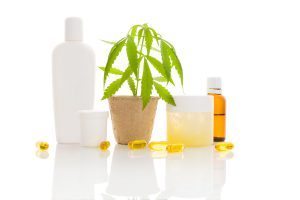Although more and more people are interested in the benefits of medical cannabis, without proper physician guidance some people have come to fear the side effects of intoxication associated with THC. Staggering numbers of people have turned to cannabidiol, or CBD, a type of medicine found in cannabis that does not cause intoxication, to help treat conditions ranging from chronic pain to anxiety. However, as previously explained in an article on CBD medical benefits, there is not enough evidence yet to suggest that CBD is effective in treating anything except rare epileptic conditions in children.
The good news for patients is that there is another medicine readily found in cannabis shown to decrease inflammation and act as an analgesic, all without the “high” brought on by THC: THC-A. Easily confused with THC, THC-A or tetrahydrocannabinolic acid is an acid form cannabinoid. Cannabinoid acids do not activate the CB1 receptors in our brains, meaning that they are non-intoxicating when taken alone. THC-A is far more effective at treating pain and inflammation than CBD, and it is far more accessible (read: affordable), as well. Boston medical marijuana doctor Jordan Tishler explains.
What Is THC-A and Where Can I Find It?
THC-A is actually the most abundant cannabinoid found in medical cannabis. In fact, raw cannabis actually contains THC-A, not THC. Only when heated does THC-A convert to THC – this process is known as decarboxylation, and is why it is necessary to cook or vaporize cannabis in order to feel the intoxicating side effects of the THC.
Unfortunately, dispensaries typically do not sell THC-A as an extract yet, but given that THC-A is plentiful in medical cannabis, it is possible to extract large amounts at home to make a tincture you can use sublingually. This process involves freezing 100% pure ethanol and raw cannabis overnight, and then combining them to strip the THC-A from the plant material. You will also need canola oil, lemon extract, a coffee filter, and access to a well-ventilated area in order to allow the solution to dry. We provide a full recipe on how to use a cold extraction technique to make a THC-A tincture.
Medical Benefits of THC-A
There is good evidence that THC-A can help those with autoimmune diseases such as rheumatoid arthritis, lupus, and Crohn’s Disease. Studies conducted on both mice and humans have suggested that THC-A is effective in treating inflammatory bowel diseases. A powerful neuroprotectant and anti-inflammatory, THC-A may also be 20x as effective at treating headaches than aspirin.
There is support for using THC-A to help treat patients with similar conditions like Alzheimer’s, Parkinson’s, Multiple Sclerosis, and ALS, but THC-A has not yet been tested on humans with these conditions.
Is THC-A Safer Than CBD?
Hands down, THC-A is a better alternative to CBD. Not only is THC-A 10-20 times more effective as an anti-inflammatory and analgesic, but it is safer than CBD, too. CBD is broken down by the same enzyme in the liver that breaks down many other common medications, like some blood thinners, heart medications, and immunosuppresants. For many patients with complex illnesses, especially those taking multiple medications, interactions between drugs can be serious and dangerous. However, the liver enzyme that handles CBD and those other medications is not involved in the breakdown of THC-A, and negative interactions between THC-A and patient medications are rare, making it a far safer option than CBD.
How Much THC-A Should I Take?
Generally, 10-80mg twice a day tends to be enough. Although THC-A is safe and non-intoxicating, it is important to titrate dosing slowly, increasing your dose over the course of many weeks if necessary.
Contact Our Boston Medical Marijuana Healthcare Professionals Today
If you are considering using THC-A, CBD, or any medicine found in cannabis, it is best to consult with a Massachusetts medical marijuana healthcare professional that is knowledgeable about medical cannabis. As a trained medical expert and faculty at Harvard Medical School, Jordan Tishler stands ready to help patients determine if medical cannabis may benefit them. For more information, or to set up a consultation with the team at InhaleMD, call us at (617) 477-8886 today.

